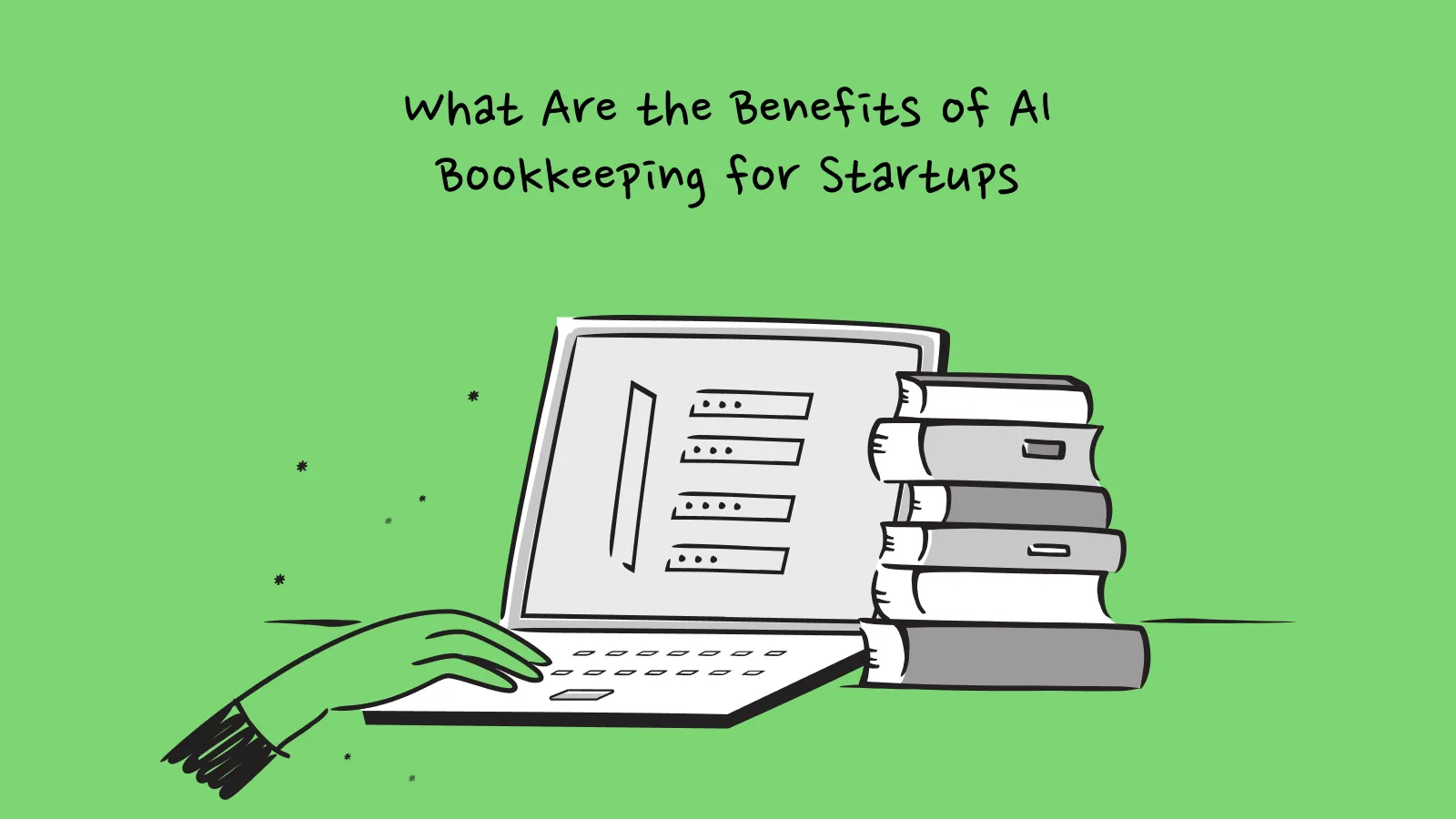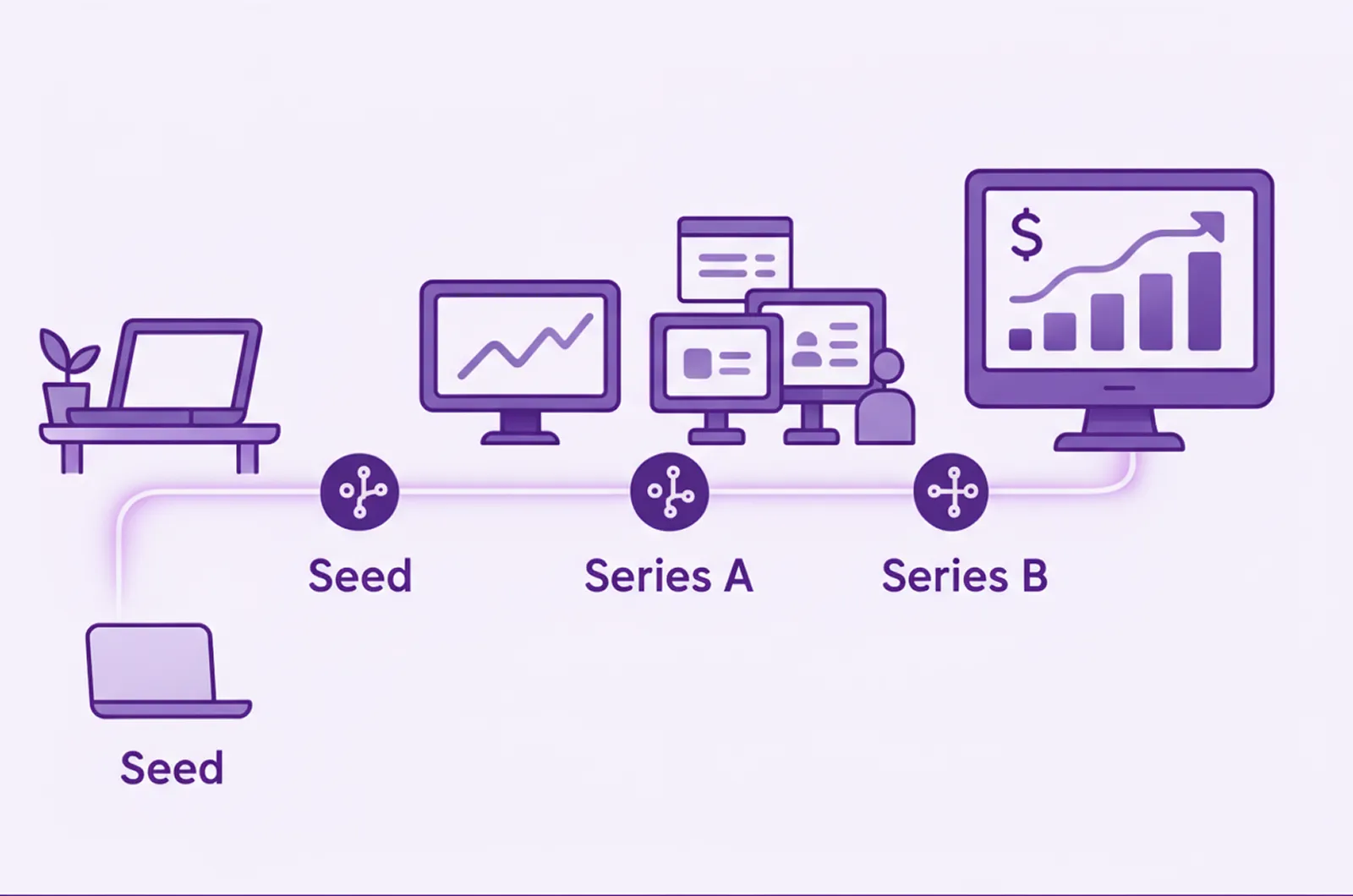What Are the Benefits of AI Bookkeeping for Startups

Startup founders already do enough - product development, customers, hiring, and fundraising. But bookkeeping? That’s one task you would rather automate. Manual bookkeeping drains time, invites errors, and slows down decision-making when speed matters most.
AI bookkeeping gives founders a smarter way to manage finances. By using AI to categorize, reconcile, and report transactions automatically, startups can save hours every month, reduce costs, and get real-time visibility into their numbers. In this article, we’ll explore how automation transforms bookkeeping from time savings and accuracy to tax compliance, scalability, and financial confidence.
How Automation Saves Time in Everyday Bookkeeping
.webp)
For startup founders, time is one of the scarcest resources. Manual data entry, receipt matching, reconciliations can take hours each week. Automation removes those repetitive tasks completely, keeping your books up to date while you focus on growth, customers, and strategy.
- Automation imports and categorizes every transaction from your bank accounts and payment tools in seconds.
- It reconciles accounts automatically, matching deposits, payments, and invoices without manual review.
- It speeds up month-end closings and generates reports instantly, saving days of back-and-forth corrections.
Automation and AI Improve Accuracy and Reduces Risk
When you’re running a startup, even small bookkeeping errors can snowball into big financial problems. Automation eliminates those risks by keeping your books accurate, consistent, and always up to date. With AI systems handling categorization and reconciliation, founders get cleaner data and fewer surprises during audits, tax season, or fundraising.
1. AI Bookkeeping Ensures Consistent Categorization Across Every Transaction
AI systems follow predefined rules to classify expenses and revenue correctly every time. Unlike manual bookkeeping where different people may tag similar transactions differently, automation ensures uniform categorization, making your financial statements more reliable and easier to analyze.
2. AI Detects and Flags Errors Instantly
AI algorithms continuously scan for irregularities like missing receipts, duplicate entries, or mismatched payments. Whenever a problem is found, the system alerts you immediately, so you can correct it before it snowballs into bigger issues or inaccurate reports.
3. It Applies Standardized Accounting Logic to Every Entry
Human judgment varies, especially when multiple people handle bookkeeping. Automation removes that inconsistency by applying the same accounting logic to every transaction. The result is clean, comparable data that’s easier to reconcile, audit, and share with investors.
4. It Reduces Compliance and Reporting Risks
Accurate data keeps your startup compliant. AI systems maintain records in the right format, with timestamps and audit trails that meet reporting requirements. This minimizes the risk of filing mistakes, missed deductions, or regulatory penalties.
Why Real-Time Financial Insights Matter for Startups
For startup founders, timing is everything. Decisions about hiring, marketing spend, or fundraising can’t wait weeks for financial reports. Real-time bookkeeping automation bridges that gap by keeping your numbers live and your insights current. Instead of reacting to outdated data, founders can make faster, smarter choices based on what’s happening right now.
1. Real-Time Visibility Helps You Stay in Control of Cash Flow
Automation gives you an up-to-the-minute view of your cash position. You can see how much money is coming in and what’s going out without waiting for a manual report.
2. Live Insights Enable Faster, Data-Driven Decisions
When your financial data updates automatically, you can act with confidence. Whether it’s approving a new hire, increasing marketing spend, or adjusting your budget, you’ll always know where your business stands.
3. Continuous Tracking Helps Spot Trends Before They Escalate
Real-time systems help you detect patterns early like rising costs, declining margins, or slow-paying customers. By identifying these trends immediately, you can take corrective action before they impact profitability or growth.
4. Real-Time Dashboards Keep Founders and Teams Aligned
Automation turns complex financial data into visual dashboards that update continuously. This helps founders, investors, and team leads see the same accurate picture, improving collaboration and decision-making.
Here’s what real-time automation enables for startups:
- It provides continuous visibility into cash flow, income, and expenses.
- It supports faster budgeting and purchasing decisions.
- It highlights trends early to protect profitability.
- It ensures founders always know where their business stands.
Real-time insights turn bookkeeping from a back-office function into a growth tool. With automation, founders get the clarity to move fast without sacrificing control or accuracy.
AI Supports Tax Compliance and Reduces Stress
Tax season shouldn’t feel like a crisis, yet for many startups it still does. Disorganized books, missing receipts, and inconsistent records often lead to rushed filings, errors, or missed deductions. AI bookkeeping eliminates that chaos by keeping your financial data organized, categorized, and ready for tax time year-round.
1. AI Bookkeeping Tracks Deductible Expenses Automatically
Every expense is categorized the moment it’s recorded, ensuring deductible items are never overlooked. This makes it easy to identify eligible deductions when filing and helps founders maximize tax savings without extra effort.
2. It Keeps Your Books Audit-Ready at All Times
Instead of waiting for year-end reconciliation, AI systems maintain audit-ready reports continuously. With every transaction linked to supporting documents, your financials stay organized and verifiable, reducing stress if you ever face an audit.
3. IT Minimizes Filing Errors and Missed Deadlines
By keeping records accurate and up to date, automation prevents common filing mistakes like duplicate entries or misclassified expenses. It also helps track important dates and reminders, ensuring you never miss a deadline or pay unnecessary penalties.
Here’s how AI makes compliance easier for startups:
- It automatically tracks deductible expenses by category.
- It prepares audit-ready reports throughout the year.
- It reduces filing errors and eliminates last-minute stress.
Automation gives founders peace of mind during tax season. With accurate, organized data and built-in compliance tracking, tax prep becomes a routine task, not a yearly headache.
Startups Save Money with AI Bookkeeping
For many founders, automation feels like an investment but in reality, it’s one that pays for itself quickly. By reducing manual work, preventing costly errors, and speeding up reporting, AI bookkeeping cuts overall financial management costs significantly. It also makes spending more predictable, helping startups stay within budget as they grow.
AI systems eliminate the need for large bookkeeping teams or expensive cleanup work at the end of each quarter. With software handling categorization, reconciliation, and reporting, founders save both money and time.
Errors in manual bookkeeping like duplicate charges, missed invoices, or misclassified expenses often go unnoticed. Automation catches these issues immediately, preserving cash flow and improving profitability.
AI Systems Scale with Your Business Growth
As startups grow, so does the complexity of their finances. Manual bookkeeping can’t keep up with that pace. Automation, however, scales effortlessly, adapting to your business as it expands. Whether you add new accounts, payment platforms, or revenue streams, AI systems adjust automatically without requiring extra staff or setup time.

1. AI Bookkeeping Handles Higher Transaction Volumes Seamlessly
AI-powered systems can process thousands of transactions per month without slowing down. This means founders don’t need to worry about data overload or performance bottlenecks as their startup scales.
2. It Manages Multiple Accounts and Revenue Streams
From Stripe and Shopify to multiple bank accounts or subsidiaries, AI bookkeeping connects everything into one unified dashboard. No matter how complex your structure becomes, your data remains clean and consistent.
3. It Supports Growth Without Increasing Costs
Unlike traditional bookkeeping, automation doesn’t require additional hours or resources as your workload increases. Startups can continue to grow while maintaining predictable bookkeeping costs and consistent reporting quality.
Here’s how AI scales with your business:
- It processes higher transaction volumes without slowing down.
- It manages multiple accounts and currencies in one system.
- It supports expansion without needing more bookkeeping staff.
AI bookkeeping grows with your startup, not against it. It keeps your financial systems efficient, accurate, and ready for scale so you can focus on building, not balancing.
Automation Protects Financial Data and Ensures Business Continuity
For startups, financial data is one of the most valuable assets, and one of the easiest to lose through human error, system failures, or outdated tools. AI bookkeeping systems are built with enterprise-grade security, protecting your records while ensuring your business can run smoothly even if something goes wrong.
1. Automation Keeps Data Safe Through Encrypted, Cloud-Based Storage
All financial information is stored securely in the cloud using bank-grade encryption. This ensures sensitive data like bank transactions, payroll, and tax information remains protected from breaches or unauthorized access.
2. Automation Maintains Automatic Backups and Version History
AI systems continuously back up your data, maintaining detailed version histories. If a file is lost or an error occurs, you can instantly restore your financial data without downtime or data loss.
3. Automation Enables Secure Collaboration and Easy Access
With secure cloud sharing, founders, accountants, and investors can access the latest financial records anytime without emailing files or using outdated drives. Access controls ensure only authorized users can view or edit sensitive data.
Here’s how automation safeguards your startup’s financial data:
- It uses encrypted cloud storage to keep financial data protected.
- It maintains AI backups and recovery systems to prevent data loss.
- It enables secure collaboration and controlled access for stakeholders.
AI bookkeeping keeps your startup’s finances accurate and safe. With reliable backups and advanced security, you can operate confidently knowing your data is protected and accessible anytime, from anywhere.
How Inkle Makes AI Bookkeeping Simple for Startups
Inkle brings the power of automation and AI to startup bookkeeping. Built for founders, Inkle combines AI-driven automation with an easy-to-use interface, making bookkeeping fast, accurate, and stress-free.
Inkle connects directly to your bank accounts, payment platforms, and accounting tools. It automatically categorizes transactions, reconciles data, and generates monthly reports that are audit- and investor-ready. Real-time dashboards show income, expenses, and runway at a glance helping founders make quick, informed financial decisions.
- Inkle uses AI to categorize and reconcile transactions automatically across all accounts.
- It provides live dashboards and reports that are tax-ready and updated continuously.
- It’s simple to set up, requiring minimal training or onboarding time.
Inkle is the ideal bookkeeping solution for startups that want automation without the hassle. It saves founders hours of manual work each month while ensuring every record is clean, compliant, and ready for review. No spreadsheets required.
Ready to simplify your startup’s bookkeeping? Book a demo with Inkle and see how AI-powered automation can help you save time, reduce costs, and scale confidently.
Frequently Asked Questions
What types of tasks can AI bookkeeping handle?
AI bookkeeping can manage most day-to-day financial operations, including importing transactions, categorizing expenses, reconciling accounts, generating reports, and preparing tax-ready records. It handles these tasks in real time, reducing manual effort and keeping your books continuously up to date.
Is AI bookkeeping accurate enough for tax filings?
Yes. AI bookkeeping tools like Inkle apply consistent accounting logic to every transaction, minimizing human errors and ensuring accurate categorization. This keeps your books organized and fully compliant for tax filings and audits.
Can startups afford AI bookkeeping?
Absolutely. Most AI bookkeeping platforms are designed for startups and small businesses with predictable, flat-rate pricing. The time saved and errors avoided often outweigh the cost of the software.
Do I still need a bookkeeper if I use automation?
Not necessarily. Many startups manage their finances entirely through AI tools. However, some choose to consult a bookkeeper periodically for expert oversight, especially during fundraising or year-end reviews.
Is my financial data safe in AI systems?
Yes. Reputable providers use secure, encrypted cloud storage with multi-factor authentication and AI backups. Inkle, for example, follows strict data protection and compliance protocols to keep your startup’s financial data safe and accessible only to authorized users.


.webp)
.webp)
